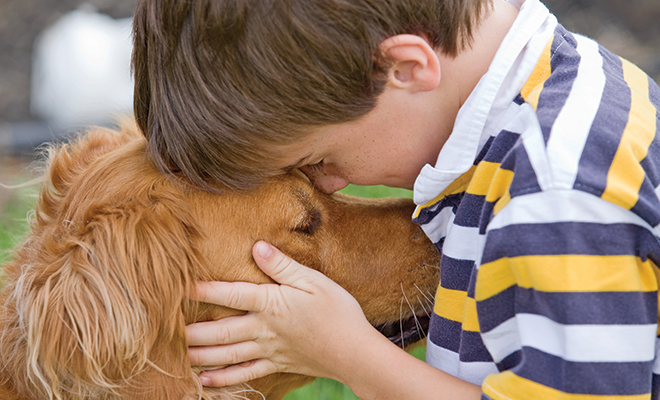
Dogs: Making Kids Smarter, Healthier and More Compassionate
The idea of a boy or girl and a dog is iconic, the theme of hundreds of books, movies and television shows. Experts are now finding that for many kids, it’s more than a plot device for fictional childhood adventures. There are a number of health benefits for kids in having a dog, both physical and psychological.
Some of the latest research has linked contact with dogs, including dog kisses, to disease prevention. Studies presented at the American College of Allergy, Asthma and Immunology Annual Scientific Meeting indicated that children raised in a home with a dog have fewer colds and ear infections and need fewer antibiotics than children raised in dog-free homes. One study from Finland showed that children who live with a dog were 31 percent more likely to be healthier. Households with cats had only a six percent improvement.
For young children, the numbers were even greater. Early exposure, said researcher Dr. Eija Bergroth, who published his study in the journal Pediatrics, showed that they were 44 percent less likely to develop problems such as ear infections. His theory is that exposure to dogs primes a baby’s immune system to fight off bacteria and viruses.
There is strong evidence that having a dog in the home can lower a child’s risk of developing childhood eczema and, later in life, asthma or allergies. A combined study by the University of Arizona and University of Colorado showed a stronger relationship between the “good” gut bacteria found in yogurt in people who share their homes with a dog than those who do not.
For kids, this good gut bacteria seems to have a direct result in reducing the rate of immune-related illnesses, including asthma and allergies and, some studies suggest, inflammatory gastrointestinal diseases such as Crohn’s disease. The effect is especially strong with children a year old or younger.
“I have seen many psychological benefits from therapy dogs around the hospital to both patients and staff,” said pediatric nephrologist Kevin Barton. “It makes sense that dogs would accumulate dirt, allergens and bacteria that could provide some immunologic benefit to children.”
Retired Purdue University research psychologist Gail Melson, who has been doing research on the kid-dog connection since the 1980s and is currently author of the blog Why the Wild Things Are, says that dogs and other pets can have a profound effect on a child’s psychological health. “Children report overwhelmingly that they get emotional support, the feeling that you are loved and accepted, from their pets,” she said. “For them, their dog is their friend. There is a special social bond.”
A study published in the journal Social Development looked at nearly 100 families and their dogs. The children, ages 7 to 12, were asked to perform public speaking and mental arithmetic and then were tested for levels of stress hormones. Kids who had their dogs with them were found to be less stressed, with the rate of stress even in lower in kids who got to pet or cuddle their dogs.
“You can imagine children who are lonely or having a difficult transition where support is especially important,” Melson said “We’re talking about a dog who is a member of the family. Dogs don’t make judgment, regardless of what you do or who you are. Children self-report stress reduction, with a lowering of blood pressure and heart rates, in the presence of a friendly dog.”
Melson believes that dogs can also teach children to be better world citizens. “In my work, we call what dogs can teach nurturing. It’s caring for someone besides yourself. We know that kids are not born with this skill, but being a caregiver is an important role.” Much of what children learn at home or at school are work-related skills. Having pets is one of the few opportunities for kids to learn about nurturing, she said. “One thing my research showed was that by age five, the perception of caregiving of babies or the elderly was seen as the job of females.” When it came to nurturing animals, the gender ideas disappeared. “Having a pet dog is an opportunity for parents to encourage both boys and girls to care about others.”
Having a dog can increase a child’s emotional intelligence, as well. This, Melson said, could have wider implications for the future. “As kids grow older they’ll be dealing with things such as climate change, animal welfare, all sorts of issues.”
The choice to have a dog remains a personal one. Parents with children who have existing medical conditions may need to talk with their child’s physician before getting a dog. But, the research shows that for many families, a dog might be just what the doctor ordered. ■
Sources: acaai.org, blogs.scientificamerican.com, huffingtonpost.com, mnn.com and nytimes.com.







